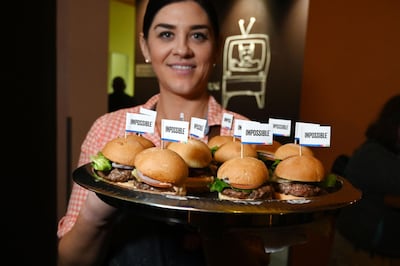Working from home in lockdown has sharpened people’s focus on changing their eating habits and adopting a diet that will improve their mental health.
That was the message from industry insiders who were speaking at the Gulfood conference, which is taking place in Dubai this week.
How food is made and where it comes from is a key part of consumer decision-making, which companies now have to be acutely aware of, experts told The National.
Fonterra
“Health and wellness is the biggest trend in the food industry right now,” said Helena Jannetta, marketing director of dairy firm Fonterra.
“Consumers are more and more concerned with what they are putting into their bodies.
“The interest in this sector continues to grow hugely since the start of the Covid-19 pandemic.”

She said the last couple of years made people more aware of the need to eat healthy, nutritious foods that do not affect their sleep patterns or cause their stress levels to rise.
“There’s definitely been a sharp focus in that direction and people are more willing to try food they might not have done before,” said Ms Jannetta.
Another trend shows consumers moving away from highly processed food.
“People want their food to be cleaner than before. That means fewer ingredients and knowing where it is coming from and how it is made,” she said.
One of the major habits emerging was the rise of the conscious consumer, she said.
This means people are increasingly concerned with the ethical side of food production — from the environmental impact to how packaging should be disposed.
“Conscious consumers are ruling the roost at the moment because they are pushing manufacturers to be more aware about what they are producing and how they are doing it,” said Ms Jannetta.
The rise of plant-based products is one such example of how eating habits are changing, she said.
The global market for plant-based foods was worth more than $35 billion at the end of 2021.
This figure is expected to reach $162 billion by 2030, according to Bloomberg. That is a 7.7 per cent share of the world’s protein market.
There has been a surge in demand for plant-based meat alternatives in the last six months, according to another UAE-based food industry expert.

“Traceability and sustainability are more important than ever with consumers,” said Simon Ritchie, creative director with burger chain Pickl, who was also speaking at Gulfood.
“We saw a huge uptick in people ordering the Impossible Burger since we introduced it in September.
“We had vegetarian options before but nothing was as popular as this.”
He put the success of the plant-based burger down to the fact people could trace what it was made from, which gave assurances they were purchasing an ethical product.
Mr Ritchie said that plant-based food might have once been seen as appealing only to vegans and vegetarians, but that was no longer the case.
His company's data suggests people are not turning their back on meat but are seeking out alternatives to make their diet more balanced.
“They feel less guilty when they order the plant-based burger instead of the meat option,” said Mr Ritchie.
“At the start of the pandemic people were often stuck in the house and eating more than they might have done before then.
“Now they are starting to try to peg that back a little bit and one of the ways they are doing it is by going for healthier options.”
One of the criticisms of eating healthy food was that it was expensive to do so, which meant consumers would often seek out alternatives that were less healthy to save cost.
“People often perceived it was more expensive to buy local produce, and that was not the wrong perception at the time,” he said.
“Now farmers have come together and are working with suppliers to bring prices down, which is excellent news for consumers.
“I think we are only going to see more uptake, especially from companies that were slow to adapt and are realising customers want those healthy options.”












